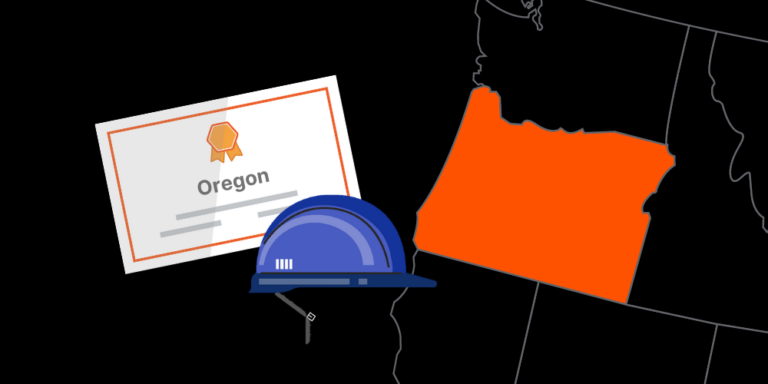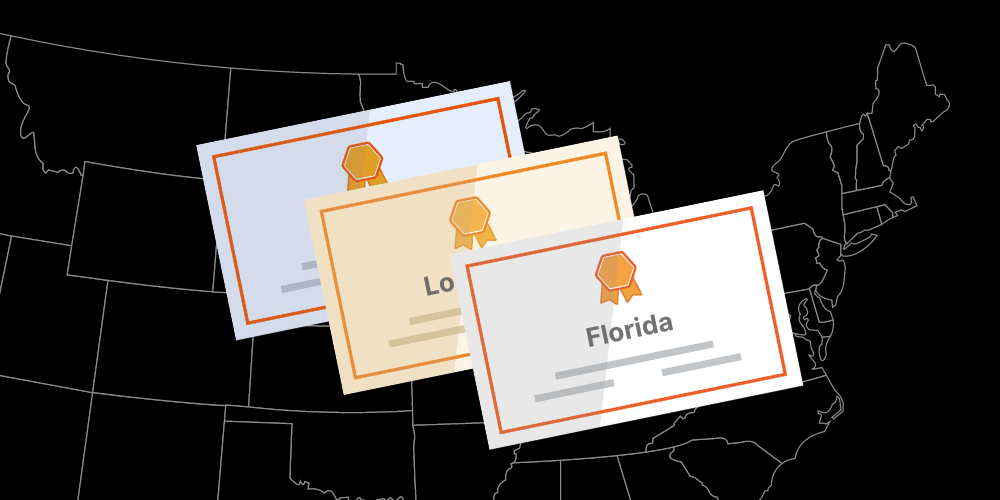— 6 min read
Oregon Contractor Licensing Guide
Last Updated Jan 30, 2025
Last Updated Jan 30, 2025

Oregon requires that "anyone who works for compensation in any construction activity" obtain a license. The list of contractors who need a license includes roofers, carpenters, electricians, plumbers, home inspectors, and many more. While there are a few exceptions — like for gutter cleaning or power washing — the bottom line is that nearly everyone working in construction needs to go through the Oregon contractor licensing process.
Fortunately, obtaining a license is not difficult if you know the steps, like registering your business, getting insurance, and filling out an application. Read on if you're looking to get licensed as a contractor in Oregon.
Table of contents
How to get an Oregon contractor license
Licensing for contractors in Oregon is handled by the Construction Contractors Board (CCB). There are a number of different licenses to choose from, and Oregon refers to each of these options as "endorsements," which vary depending on the type of work you'll be doing as well as the structures you plan to work on.
1. Complete pre-license training and take an examination
Before beginning the contractor licensing process, you are responsible for completing 16 hours of law and business training (called "Responsible Managing Individual" training or RMI for short). Once the training is complete, you must pass an open-book test.
2. Determine your endorsement type
Your license specifies what kind of structures you are qualified to work on. With different endorsements, you qualify to work on different types of residential and commercial construction projects — but the qualifications and criteria for each endorsement vary. Contracting businesses can work on many different types of projects as long as they have the required endorsements, so some businesses may hold several endorsements at once. However, those businesses need to ensure they are fully bonded and insured for all of the different project types they work on.
Here are some of the endorsements that Oregon offers:
- Residential General Contractor (RGC)
- Residential Limited Contractor (RLC), will not exceed $40,000 in annual volume
- Residential Developer (RD)
- Commercial General Contractor Level 1 (CGC1), has eight years of construction experience
- Commercial General Contractor Level 2 (CGC2), has four years of construction experience
- Commercial Developer (CD)
- Residential Specialty Contractor (RSC)
- Home Services Contractor (HSC), home services warranty agreement
- Residential Locksmith Services Contractor (RLSC)
- Home Inspector Services Contractor (HISC)
- Home Energy Performance Score Contractor (HEPSC)
- Residential Restoration Contractor (RRC)
- Commercial Specialty Contractor Level 1 (CSC1), has eight years of construction experience
- Commercial Specialty Contractor Level 2 (CSC2), has four years of construction experience
A full list of endorsements — as well as bond and insurance requirements — is available on the Oregon Construction Contractors Board website.
Trade contractors
For trade contractors, the process of applying for a contractor’s license is the same as for general contractors. Each company must have an RMI that takes the business class and passes the test.
Trade contractors need to have at least one licensed plumber, electrician, or technician, depending on the selected field. Trade contractors also need to pull separate business licenses as well.
Both individual and business licenses for trade contractors (electrical, plumbing, boiler, elevator, and manufactured dwellings) are issued through the Building Codes Division.
Landscaping contractors
Landscaping contractors apply for licensing from the Landscape Contractors Board. The contractor must have two licenses, one for an individual and one for the company.
3. Register your business
You'll need to file information about your business name and structure (e.g. sole proprietorship, LLC, or corporation) with the Oregon Secretary of State by following the steps listed for registering a business in Oregon.
4. Provide proof of insurance and bonds
In Oregon, contractor bond requirements are determined by whether the contractor is doing residential or commercial work (or a combination) in addition to the contractor’s trade being general, specialty, or limited. If a contractor is doing both residential and commercial work, they must hold two surety bonds.
Any contractor in Oregon needs both insurance and a surety bond to obtain a license. Here's exactly what you need to submit:
- Proof of a CCB surety bond in the required amount. You can refer to the list of Oregon bond resources.
- Evidence of general liability insurance in the required amount. Check the liability insurance requirements to ensure you have the right amount of insurance, which should list the Construction Contractors Board as the Certificate Holder.
- Documentation of worker's compensation insurance if you plan to have employees. Refer to Oregon worker's compensation insurance requirements for more details.
With proof of insurance, you're ready to fill out your application for a license.
5. Complete an application
Fill out the correct application for your endorsement type, pay the application fee ($325 for a two-year license), and be prepared to provide state and federal tax numbers for your registered business.
There are multiple applications so be sure to select the one specific to your endorsement:
- Residential only
- Commercial only
- Dual endorsement (both residential and commercial)
The CCB will process your application, and you can go through the renewal process when you're license is set to expire.
Stay updated on what’s happening in construction.
Subscribe to Blueprint, Procore’s free construction newsletter, to get content from industry experts delivered straight to your inbox.

Licensing in cities and municipalities
In Portland, the largest city in Oregon, contractors are required to register with Metro, which is a local government covering most of the Portland metropolitan area.
Companies must submit a form and pay a fee to be licensed, and then they are subject to additional income taxes and transit authority payments, based on how much work they do in the Portland area. Any company that performs work in Portland, no matter where they are located, has to be licensed with Metro and is subject to local taxes.
In Salem, the state capital, contractors are not required to have any additional licensing.
Many of the smaller cities and municipalities around the state require business licenses for contractors. They often need to be purchased before a company can pull permits on a project. The fees for these licenses are usually minimal and all that is required is to complete an application.
Always check the website for the city you’ll be working in for its specific licensing requirements.
Oregon contractor licensing penalties
Oregon contractor licensing requirements are taken very seriously by the state. State statute allows the Construction Contractors Board to assess civil penalties for companies that perform construction work without a license. Oregon Inspectors regularly visit job sites and gather the names of the companies working on-site to confirm that they are licensed.
In addition, the principals of companies that work without a license are placed on a blacklist of sorts, and the Contractors Board encourages consumers not to hire them.
Additionally, in order to perfect or collect on a mechanics lien in Oregon, the entity filing it must be a licensed contractor. Note: this does not apply to design professionals or other companies that have lien rights due to the type of work they provide.
Since only licensed contractors can enforce their lien rights, it pays to get licensed in Oregon.
Was this article helpful?
Thank you for your submission.
50%
50%
You voted that this article was . Was this a mistake? If so, change your vote here.
Scroll less, learn more about construction.
Subscribe to The Blueprint, Procore’s construction newsletter, to get content from industry experts delivered straight to your inbox.
By clicking this button, you agree to our Privacy Notice and Terms of Service.
Categories:
Tags:
Written by
Dawn Killough
34 articles
Dawn Killough is a writer with over 20 years of experience in construction, having worked as a staff accountant, green building advisor, project assistant, and contract administrator. She holds a BA in Psychology and MS in Conflict Resolution, both from the University of Portland. She shares fundamental green building strategies and techniques in her book, Green Building Design 101. Dawn lives in Portland, Oregon.
View profileExplore more helpful resources

Contractor License Bonds: Everything You Need to Know
In order to perform construction work, many states require contractors to be “licensed and bonded.” What does that mean? Well, every state sets its own rules for contractor licensing, and...

Contractor’s Guide to License Reciprocity: Working Across State Lines
For many contractors, growing a construction business means taking on jobs in different states. Whether it’s to take a one-off project or to establish a new business location, working in...

Vermont Contractor License: Guide to Rules & Requirements
If you’re starting a construction business in Vermont or looking to expand your business from another state, being properly licensed to work is one of the first key steps. There...

The Maine Contractor License: Guide to Rules & Requirements
If you’re considering starting a contracting business in Maine, it’s important to know the rules and requirements for proper licensing. Maine takes a different approach to contractor licensing than most...